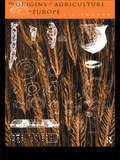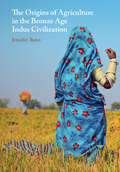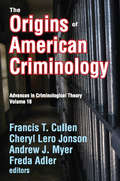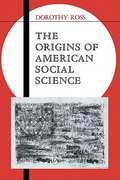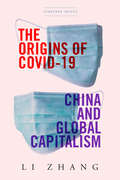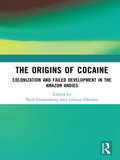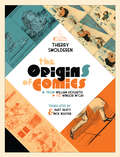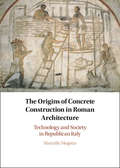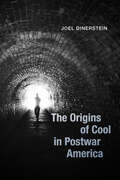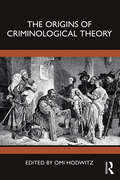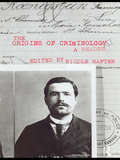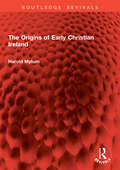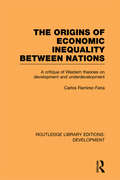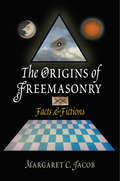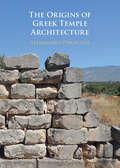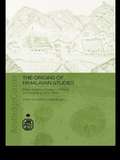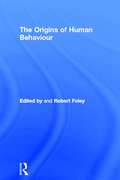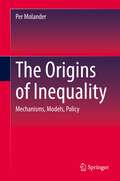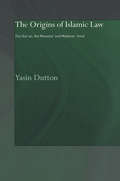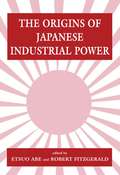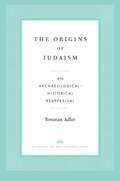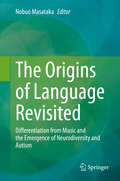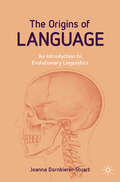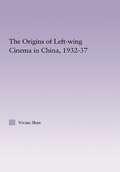- Table View
- List View
The Origins of Agriculture in Europe (Material Cultures Ser.)
by I. J. ThorpeThe Origins of Agriculture in Europe takes a look at current ideas in the light of a considerable mass of literature and archaeological evidence; examining the transition to agriculture through the comparison of social and economic developments across Europe. In this volume, I.J.Thorpe manages to evaluate various alternative explanations in detailed examples, whilst also succeeding in addressing the broader theoretical questions which form the nucleus of contemporary debates. This clearly written and accessible text is an extremely valuable resource for students of European prehistory.
The Origins of Agriculture in the Bronze Age Indus Civilization
by Jennifer BatesThe Indus civilization in South Asia (c. 320 – 1500BC) was one of the most important Old World Bronze Age cultures. Located at the cross-roads of Asia, in modern Pakistan and India, it encompassed ca. one million square kilometers, making it one the largest and most ecologically, culturally, socially, and economically complex among contemporary civilisations. In this study, Jennifer Bates offers new insights into the Indus civilisation through an archaeobotanical reconstruction of its environment. Exploring the relationship between people and plants, agricultural systems, and the foods that people consumed, she demonstrates how the choices made by the ancient inhabitants were intertwined with several aspects of society, as were their responses to social and climate changes. Bates' book synthesizes the available data on genetics, archaeobotany, and archaeology. It shows how the ancient Indus serves as a case study of a civilization navigating sustainability, resilience and collapse in the face of changing circumstances by adapting its agricultural practices.
The Origins of American Criminology: Advances in Criminological Theory (Advances In Criminological Theory Ser. #16)
by Freda Adler Francis T. Cullen Cheryl Lero Jonson Andrew J. MyerThe Origins of American Criminology is an invaluable resource. Both separately and together, these essays capture the stories behind the invention of criminology's major theoretical perspectives. They preserve information that otherwise would have been lost. There is urgency to embark on this reflective task given that the generation that defined the field for the past decades is heading into retirement. This fine volume insures that their life experiences will not be forgotten. The volume shows criminology to be a human enterprise. Ideas are not driven primarily-and often not at all-by data. Theories are not invented solely as part of the scientific process; they are not inevitable. American criminology's great theories most often precede the collection of data; they guide and produce empirical inquiry, not vice versa. Theoretical paradigms are shaped by a host of factors-scholars' assumptions about the world drawn from their social constructs, disciplinary content and ideology, cognitive environments found in specific universities and the field's scholarly networks, and, quirks in a person's biography. The volume demonstrates that humanity is what makes theory possible. Diverse experiences-when we were born, where we have lived, the unique trajectories of our personal life courses, the disciplines and academic places we have ended up-allow individual scholars to see the world differently.
The Origins of American Social Science: Ideas in Context
by Dorothy RossRoss takes the reader on a journey through social science as practiced in America.
The Origins of COVID-19: China and Global Capitalism
by Li ZhangA new strain of coronavirus emerged sometime in November 2019, and within weeks a cluster of patients began to be admitted to hospitals in Wuhan with severe pneumonia, most of them linked to the Huanan Seafood Wholesale Market. China's seemingly effective containment of the first stage of the epidemic, in glaring contrast with the uncontrolled spread in Europe and the United States, was heralded as a testament to the Chinese Communist Party's unparalleled command over the biomedical sciences, population, and economy. Conversely, much academic and public debate about the origins of the virus focuses on the supposedly "backwards" cultural practice of consuming wild animals and the perceived problem of authoritarianism suppressing information about the outbreak until it was too late. The Origins of COVID-19, by Li Zhang, shifts debate away from narrow cultural, political, or biomedical frameworks, emphasizing that we must understand the origins of emerging diseases with pandemic potential (such as SARS and COVID-19) in the more complex and structural entanglements of state-making, science and technology, and global capitalism. She argues that both narratives, that of China's victory and the racist depictions of its culpability, do not address—and even aggravate—these larger forces that degrade the environment and increase the human-wildlife interface through which novel pathogens spill over into humans and may rapidly expand into global pandemics.
The Origins of Cocaine: Colonization and Failed Development in the Amazon Andes
by Paul Gootenberg Liliana M. DávalosIn the 1960s, the governments of Colombia, Peru, and Bolivia launched agricultural settlement programs in each country’s vast Amazonian frontier lowlands. Two decades later, these exact same zones had transformed into the centers of the illicit cocaine boom of the Americas. Drawing on concepts from both history and anthropology, The Origins of Cocaine explores how three countries with divergent different mid-century political trajectories ended up with parallel outcomes in illicit frontier economies and cocalero cultures. Bringing together transnational, national, and local analyses, the volume provides an in-depth examination of the deep origins of drug economics in the Americas. As the first substantial study on the shift from agrarian colonization to narcotization, The Origins of Cocaine will appeal to scholars and postgraduate students of Latin American history, anthropology, globalization, development and environmental studies.
The Origins of Comics: From William Hogarth to Winsor McCay
by Thierry SmolderenIn The Origins of Comics: From William Hogarth to Winsor McCay, Thierry Smolderen presents a cultural landscape whose narrative differs in many ways from those presented by other historians of the comic strip. Rather than beginning his inquiry with the popularly accepted "sequential art" definition of the comic strip, Smolderen instead wishes to engage with the historical dimensions that inform that definition. His goal is to understand the processes that led to the twentieth-century comic strip, the highly recognizable species of picture stories that he sees crystallizing around 1900 in the United States. Featuring close readings of the picture stories, caricatures, and humoristic illustrations of William Hogarth, Rodolphe Töpffer, Gustave Doré, and their many contemporaries, Smolderen establishes how these artists were immersed in a very old visual culture in which images—satirical images in particular—were deciphered in a way that was often described as hieroglyphical. Across eight chapters, he acutely points out how the effect of the printing press and the mass advent of audiovisual technologies (photography, audio recording, and cinema) at the end of the nineteenth century led to a new twentieth-century visual culture. In tracing this evolution, Smolderen distinguishes himself from other comics historians by following a methodology that explains the present state of the form of comics on the basis of its history, rather than presenting the history of the form on the basis of its present state. This study remaps the history of this influential art form.
The Origins of Concrete Construction in Roman Architecture: Technology and Society in Republican Italy
by Marcello MogettaIn this study, Marcello Mogetta examines the origins and early dissemination of concrete technology in Roman Republican architecture. Framing the genesis of innovative building processes and techniques within the context of Rome's early expansion, he traces technological change in monumental construction in long-established urban centers and new Roman colonial cites founded in the 2nd century BCE in central Italy. Mogetta weaves together excavation data from both public monuments and private domestic architecture that have been previously studied in isolation. Highlighting the organization of the building industry, he also explores the political motivations and cultural aspirations of patrons of monumental architecture, reconstructing how they negotiated economic and logistical constraints by drawing from both local traditions and long-distance networks. By incorporating the available evidence into the development of concrete technology, Mogetta also demonstrates the contributions of anonymous builders and contractors, shining a light on their ability to exploit locally available resources.
The Origins of Cool in Postwar America
by Joel DinersteinAn “entertaining” study of the enduring concept of coolness, and the mix of cultures and historical events that shaped it (The New York Times).Cool. It was a new word and a new way to be, and in a single generation, it became the supreme compliment of American culture. The Origins of Cool in Postwar America uncovers the hidden history of this concept and its new set of codes that came to define a global attitude and style. As Joel Dinerstein reveals, cool began as a stylish defiance of racism, a challenge to suppressed sexuality, a philosophy of individual rebellion, and a youthful search for social change.Through portraits of iconic figures, he illuminates the cultural connections and artistic innovations among Lester Young, Humphrey Bogart, Robert Mitchum, Billie Holiday, Frank Sinatra, Jack Kerouac, Albert Camus, Marlon Brando, James Dean, and others. We eavesdrop on conversations among Jean-Paul Sartre, Simone de Beauvoir, and Miles Davis, and on a forgotten debate between Lorraine Hansberry and Norman Mailer over the “white Negro” and black cool. We come to understand how the cool worlds of Beat writers and Method actors emerged from the intersections of film noir, jazz, and existentialism. Out of this mix, Dinerstein sketches nuanced definitions of cool that unite concepts from African-American and Euro-American culture: the stylish stoicism of the ethical rebel loner; the relaxed intensity of the improvising jazz musician; the effortless physical grace of the Method actor. To be cool is not to be hip and to be hot is definitely not to be cool.“Eminently readable. Much more than just a history of cool, this book is a studied examination of the very real, often problematic social issues that popular culture responds to.” —Publishers Weekly (starred review)“The kind of book that makes learning enjoyable.” —The Wall Street Journal“Superb.” —Times Higher Education
The Origins of Criminological Theory
by Omi HodwitzThe Origins of Criminological Theory offers a new sort of theory textbook, both in content and concept. Whereas other texts offer a mainly twentieth century account of criminological theory, this book looks further back, tracing the development of our understanding of crime and deviance throughout the ages, from Ancient Greece right through to the dawn of the rehabilitation ideal. The central objective of this book is to inform readers of the significant role the past has played in our contemporary theories of crime. Core content includes: Justice in Ancient Greece The Dark Ages and innocence The Age of Enlightenment and human nature The Classical School and Utilitarianism The medicalization of crime Biological positivism The birth of rehabilitation In addition to providing a unique approach, the book also has unique authorship. Each chapter is written by an incarcerated author housed at a men’s medium and maximum-security prison in the US. The writers are supported by one or more co-authors: university students who carry out the research for each chapter. This book therefore offers a new way of thinking about theory and makes a significant contribution to convict criminology. It will be of interest to those taking courses in criminological theory, and to programmes such as Inside Out in the US, and the Prison-University Partnerships Network in the UK.
The Origins of Criminology: A Reader
by Nicole RafterThe Origins of Criminology: A Reader is a collection of nineteenth-century texts from the key originators of the practice of criminology – selected, introduced, and with commentaries by the leading scholar in this area, Nicole Rafter. This book presents criminology as a unique field of study that took root in a context in which urbanization, immigration, and industrialization changed the class structure of Western nations. As relatively homogenous communities became more sharply divided and aware of a bottom-most group, the 'dangerous classes', a new segment of the middle class emerged: professionals involved in the work of social control. Tracing the intellectual origins of criminology to physiognomy, phrenology, and evolutionary theories, this book demonstrates criminology's background in new attitudes toward science and the development of scientific methodologies applicable to social and mental phenomena. Through an expert selection of original texts, it traces the emergence of ‘criminology’ as a new field purporting to produce scientific knowledge about crime and criminals.
The Origins of Early Christian Ireland (Routledge Revivals)
by Harold MytumThe cultural developments of Early Christian Ireland have long been recognised and described. There have, however, been few attempts to date to explain why the flowering of culture should happen at the time and in the way that it did.First published in 1992, The Origins of Early Christian Ireland (now with a new preface by the author) explains changes in the period up to AD 800 in Ireland. External stimuli, most notably from Irish settlers in western Britain acted as catalysts which transformed a relatively moribund Iron Age culture into one of extraordinary vigour. All aspects of the culture changed radically, and changes in each had knock-on effects on others. Beliefs were revolutionised by Christianity; society was transformed by the church as an institution and the rise of the individual; agriculture was expanded by more advanced technology and the entrepreneurial flair of individual decision-making; craft production became more widespread and offered a vehicle for the display of personal wealth and status. Long-distance trade and ecclesiastical contacts integrated Ireland with the rest of Europe more effectively than ever before.The book has two distinctive features, which means that it relates to two forms of academic market, each of which can be defined. Firstly, it deals with a particular culture-historical period, that of Early Christian Ireland, and presents an explanation of its origins and development to AD 800. This appeals to archaeologists and historians of Ireland, Britain and, indeed, Europe. Secondly, it takes a specific theoretical position and develops it using primarily archaeological but also extensive historical information. This is the most detailed application of processualist theory yet undertaken for a historic period in Europe. This appeals to archaeologists and anthropologists in Britain, and also North America where the processualist approach is the most popular theoretical position.
The Origins of Economic Inequality Between Nations: A Critique of Western Theories on Development and Underdevelopment (Routledge Library Editions: Development)
by Carlos Ramirez-FariaFirst published in 1991 this text provides an incisive analysis of theories concerning the origins of economic inequality between nations. Central to the author’s investigation is the concept of underdevelopment, and a focus on successive Western ‘systems of conceptualisation’ of the relationship between the west and the rest of the world. The first part of the book concerns the Marx/Engels theory of the Asiatic mode of production, and the anti-Imperialist reaction against Eurocentrisim initiated by the theoretical synthesis of J. A. Hobson. This is followed by an examination of the post-World War II era, particularly the evolution of development studies and the differing versions of dependency theory. The author concludes with an analysis of the most recent reactions against economic imperialism and dependency theory, and concludes with an assessment of their implications for the further economic development of today’s Third World.
The Origins of Freemasonry: Facts and Fictions
by Margaret C. JacobCan the ancestry of freemasonry really be traced back to the Knights Templar? Is the image of the eye in a triangle on the back of the dollar bill one of its cryptic signs? Is there a conspiracy that stretches through centuries and generations to align this shadow organization and its secret rituals to world governments and religions? Myths persist and abound about the freemasons, Margaret C. Jacob notes. But what are their origins? How has an early modern organization of bricklayers and stonemasons aroused so much public interest? In The Origins of Freemasonry, Jacob throws back the veil from a secret society that turns out not to have been very secret at all.What factors contributed to the extraordinarily rapid spread of freemasonry over the course of the eighteenth century, and why were so many of the era's most influential figures drawn to it? Using material from the archives of leading masonic libraries in Europe, Jacob examines masonic almanacs and pocket diaries to get closer to what living as a freemason might have meant on a daily basis. She explores the persistent connections between masons and nascent democratic movements, as each lodge set up a polity where an individual's standing was meant to be based on merit, rather than on birth or wealth, and she demonstrates, beyond any doubt, how active a role women played in the masonic movement.
The Origins of Global Humanitarianism
by Peter StamatovWhether lauded and encouraged or criticized and maligned, action in solidarity with culturally and geographically distant strangers has been an integral part of European modernity. Traversing the complex political landscape of early modern European empires, this book locates the historical origins of modern global humanitarianism in the recurrent conflict over the ethical treatment of non-Europeans that pitted religious reformers against secular imperial networks. Since the sixteenth-century beginnings of European expansion overseas and in marked opposition to the exploitative logic of predatory imperialism, these reformers - members of Catholic orders and, later, Quakers and other reformist Protestants - developed an ideology and a political practice in defense of the rights and interests of distant 'others'. They also increasingly made the question of imperial injustice relevant to growing 'domestic' publics in Europe. A distinctive institutional model of long-distance advocacy crystallized out of these persistent struggles, becoming the standard weapon of transnational activists.
The Origins of Greek Temple Architecture
by Alessandro PierattiniIn this book, Alessandro Pierattini offers a comprehensive study of the evolution of pre-archaic Greek temple architecture from the eleventh to mid-seventh century BCE. Demystifying the formative stages of Greek architecture, he traces how temples were transformed from unassuming shrines made of perishable materials into large stone and terracotta monuments. Grounded in archaeological evidence, the volume analyzes the design, function, construction, and aesthetic of the Greek temple. While the book's primary focus is architectural, it also draws on non-architectural material culture, ancient cult practice, and social history, which also defined the context that fostered the Greek temple's initial development. In reconstituting this early history, Pierattini also draws attention to new developments as well as legacies from previous eras. Ultimately, he reveals why the temple's pre-Archaic development is not only of interest in itself, but also a key to the origins of the Greek monumental architecture of the Archaic period.
The Origins of Himalayan Studies: Brian Houghton Hodgson in Nepal and Darjeeling (Royal Asiatic Society Books)
by David WaterhouseBrian Hodgson lived in Nepal from 1820 to 1843 during which time he wrote and published extensively on Nepalese culture, religion, natural history, architecture, ethnography and linguistics. Contributors from leading historians of Nepal and South Asia and from specialists in Buddhist studies, art history, linguistics, ornithology and ethnography, critically examine Hodgson's life and achievement within the context of his contribution to scholarship. Many of the drawings photographed for this book have not previously been published.
The Origins of Human Behaviour (One World Archaeology)
by R. A. FoleyThis volume explores the diverse ways in which the evolution of human behaviour can be investigated, and confronts the most challenging aspects of the subject.
The Origins of Inequality: Mechanisms, Models, Policy
by Per MolanderThis book presents a unified approach to the problem of inequality, combining results from a variety of research fields – the human life cycle, group dynamics, networks, markets, and economic geography. Its main message is that inequality emerges as the natural result of mechanisms operating both in individual human development and in social interaction. It posits that inequality is not an anomalous deviation from a naturally egalitarian social structure; quite to the contrary, inequality is to be expected as part of the human condition. The author states that the growth of inequality, on the other hand, is not a natural law – the level and character of inequality can be affected by collective decisions. This perspective on human inequality has potentially far-reaching consequences both for the political philosophy of inequality and for public policy-making.This book is of interest to a wide interdisciplinary social science readership, including public policy, decision sciences, economic geography, and life course studies.
The Origins of Islamic Law: The Qur'an, the Muwatta' and Madinan Amal (Culture and Civilization in the Middle East)
by Yasin DuttonIf the Qur'an is the first written formulation of Islam in general, Malik's Muwatta' is arguably the first written formulation of the Islam-in-practice that becomes Islamic law. This book considers the methods used by Malik in the Muwatta' to derive the judgements of the law from the Qur'an and is thus concerned on one level with the finer details of Qur'anic interpretation. However, since any discussion of the Qur'an in this context must also include considerations of the other main source of Islamic law, namely the sunna, or normative practice, of the Prophet, this latter concept, especially its relationship to the terms of hadith and amal (traditions and living tradition), also receives considerable attention, and in many respects, this book is more about the history and development of Islamic law than it is about the science of Qur'anic interpretation.This is the first book to question the hitherto accepted frameworks of both the classical Muslim view and the current revisionist western view on the development of Islamic law. It is also the first study in a European language to deal specifically with the early development of the Madinan, later Malik, school of jurisprudence, as it is also the first to demonstrate in detail the various methods used, both linguistic and otherwise, in interpreting the legal verses of the Qur'an. It will be of interest to all those interested in the underlying bases of Islamic law and culture, and of particular interest to those involved in studying and teaching Islamic studies, both at undergraduate and research level. It will also be of interest to those studying the relationship between orality and literacy in ancient societies and the writing down of ancient law.
The Origins of Japanese Industrial Power: Strategy, Institutions and the Development of Organisational Capability
by Robert Fitzgerald Etsuo AbeThe recognised success of the post-war Japanese economy has rested on the qualities of its manufacturing industries. This book explores the origins, rationale, and consequences of this transformation. Using theoretical insights and detailed evidence, it reviews the rise of the Japanese economy and the nature, causes, and changing objectives of vertical and horizontal integration; ownership, control, financing and bank-industry relations; and the major operational functions of production, human resources, distribution and marketing.
The Origins of Judaism: An Archaeological-Historical Reappraisal (The Anchor Yale Bible Reference Library)
by Yonatan AdlerGroundbreaking research that utilizes archaeological discoveries and ancient texts to revolutionize our understanding of the beginnings of Judaism&“A bravura study.&”—Publishers Weekly (starred review) Throughout much of history, the Jewish way of life has been characterized by strict adherence to the practices and prohibitions legislated by the Torah: dietary laws, ritual purity, circumcision, Sabbath regulations, holidays, and more. But precisely when did this unique way of life first emerge, and why specifically at that time? In this revolutionary new study, Yonatan Adler methodically engages ancient texts and archaeological discoveries to reveal the earliest evidence of Torah observance among ordinary Judeans. He examines the species of animal bones in ancient rubbish heaps, the prevalence of purification pools and chalk vessels in Judean settlements, the dating of figural representations in decorative and functional arts, evidence of such practices as tefillin and mezuzot, and much more to reconstruct when ancient Judean society first adopted the Torah as authoritative law. Focusing on the lived experience of the earliest Torah observers, this investigative study transforms much of what we thought we knew about the genesis and early development of Judaism.
The Origins of Language Revisited: Differentiation from Music and the Emergence of Neurodiversity and Autism
by Nobuo MasatakaThis book summarizes the latest research on the origins of language, with a focus on the process of evolution and differentiation of language. It provides an update on the earlier successful book, “The Origins of Language” edited by Nobuo Masataka and published in 2008, with new content on emerging topics.Drawing on the empirical evidence in each respective chapter, the editor presents a coherent account of how language evolved, how music differentiated from language, and how humans finally became neurodivergent as a species. Chapters on nonhuman primate communication reveal that the evolution of language required the neural rewiring of circuits that controlled vocalization. Language contributed not only to the differentiation of our conceptual ability but also to the differentiation of psychic functions of concepts, emotion, and behavior. It is noteworthy that a rudimentary form of syntax (regularity of call sequences) has emerged in nonhuman primates. The following chapters explain how music differentiated from language, whereas the pre-linguistic system, or the “prosodic protolanguage,” in nonhuman primates provided a precursor for both language and music. Readers will gain a new understanding of music as a rudimentary form of language that has been discarded in the course of evolution and its role in restoring the primordial synthesis in the human psyche. The discussion leads to an inspiring insight into autism and neurodiversity in humans. This thought-provoking and carefully presented book will appeal to a wide range of readers in linguistics, psychology, phonology, biology, anthropology and music.
The Origins of Language: An Introduction to Evolutionary Linguistics
by Joanna Dornbierer-StuartThis book offers an introduction to the multidisciplinary subject of evolutionary linguistics, which seeks to explain the biological origins of language and its subsequent development in humans. Roughly six million years ago, a branch of hominids from the forests of East Africa started to thrive in the drier environment created by the East African Rift System. A host of physical developments culminated in the brains of early humans increasing dramatically in size and cognitive power. Influenced by a unique and complex social organisation, communication signals became much more diverse and dependent on memory and learning mechanisms. But language is not only used to interact with our fellow beings. It is also closely connected to our thoughts. This makes language a biological, social, cultural and cognitive phenomenon all at once. What precise role did each of these aspects play in the emergence of language and how were they all coordinated to produce the most sophisticated communication system in the animal kingdom? The book aims to answer these questions and open up the fascinating world of evolutionary linguistics. It is not only aimed at scholars of linguistics, but also students from other disciplines (e.g., psychology, anthropology, evolutionary biology and cognitive science) who have an academic interest in language but may be approaching linguistics for the first time. In addition, the book should appeal to anyone with an interest in the workings of language in general, as well as advanced learners of English.
The Origins of Leftwing Cinema in China, 1932-37 (East Asia: History, Politics, Sociology and Culture)
by Vivian ShenThis book takes a cultural studies approach to analyze and account for the ways in which related to film, literature, cultural production, ideology, social change and modernity were in raised in the leftwing film movement of the 1930s.
